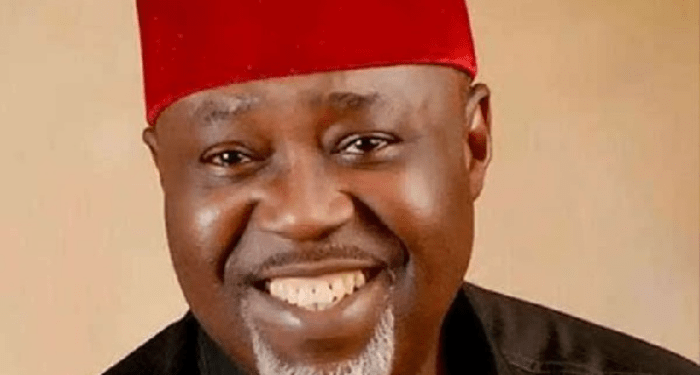By Dr. Ikenna Agu
The political landscape of Anambra State is on the cusp of a significant shift as the 2025 gubernatorial election draws near. Amidst a swirl of political recalibrations, party maneuverings, and grassroots mobilizations, one name echoes with increasing clarity across the state’s urban centres and rural hamlets alike—Chief Dr. George Moghalu. His emergence as the Labour Party’s flagbearer is not only timely but emblematic of a growing yearning among the electorate for a tested, competent, and people-oriented leader.
George Moghalu’s political journey has been a tale of resilience, loyalty, and strategic foresight. He has demonstrated a deep-rooted commitment to ideological consistency and purposeful governance. His earlier political engagements, particularly his influential role within the All Progressives Congress (APC) and his administrative acumen during his tenure as the Managing Director of the National Inland Waterways Authority (NIWA), reveal a man with a strong grasp of governance and policy implementation.
Even before clinching the Labour Party ticket, Moghalu had etched his name in the political consciousness of Anambra. He is widely regarded as one of the few leaders in the state whose public service record is unblemished and whose engagements have always been underscored by inclusiveness, transparency, and results.
The Labour Party (LP) has witnessed a political renaissance in recent years, largely fueled by the growing disillusionment with the mainstream parties and the political reawakening catalyzed by the 2023 general elections. In Anambra, LP’s strength has been augmented by its capacity to galvanize young voters, intellectuals, artisans, and professionals around a vision of credible and people-first leadership.
His choice as the Labour Party candidate has significantly energized the party’s base. His credibility bridges the gap between seasoned politicians and emerging political consciousness among the youth. The Labour Party’s internal cohesion has been instrumental in ensuring a transparent primary election. Moghalu’s victory in that primary was not just a personal triumph but also a testament to the party’s seriousness in fielding its best candidate.
One of the strongest pillars propping up Moghalu’s candidacy is his outstanding tenure as the Managing Director of NIWA. Under his stewardship, the agency saw unprecedented reform, infrastructural development, and enhanced efficiency. His leadership brought innovation to inland waterways management, promoting economic activities along Nigeria’s waterways and fostering inter-state connectivity.
For Anambra—a state bounded by the River Niger—Moghalu’s experience is particularly relevant. His understanding of maritime infrastructure, coupled with his development-oriented mindset, positions him as a candidate capable of unlocking Anambra’s economic potential through inland water transport, port revitalization, and regional integration.
Beyond his administrative achievements, Moghalu has invested years in building a robust political network across Anambra. His grassroots appeal is deep and organic, built not through transactional politics but by consistent engagement and empowerment. He has provided scholarships to indigent students, facilitated employment opportunities, supported community projects, and maintained an open-door policy for constituents and stakeholders.
His campaign strategy, steered by a competent team of technocrats and seasoned political operatives, has adopted a bottom-up approach. By engaging town unions, market leaders, youth groups, and religious institutions, Moghalu has managed to craft a statewide consensus around his gubernatorial ambition.
Anambra’s politics is traditionally influenced by zoning arrangements. With the North and Central zones having produced governors in recent cycles, there is a growing sentiment among stakeholders and political analysts that the South deserves a fair shot at the governorship. George Moghalu, an indigene of the Nnewi in Anambra South, commands respect across all zones. His wide acceptance has blurred traditional zoning lines, especially given his long-standing political relationships in Anambra North and Central.
He has continually emphasized that competence and vision should take precedence over parochial interests. His campaign slogan, “Anambra ga adi mma ozo (Anambra shall be good again)” captures the spirit of unity and shared destiny that he brings to the table.
As the 2025 Anambra gubernatorial election approaches, a prevailing sense of urgency dominates voter conversations across the state. The citizens are no longer contented with rhetorical campaigns and symbolic politics—they seek a candidate whose leadership offers pragmatic solutions to the everyday challenges of insecurity, unemployment, poor infrastructure, and economic stagnation.
In this context, George Moghalu has distinguished himself as a front-runner who resonates with the aspirations of the people. His campaign messaging is not centered on empty promises but on achievable goals, clearly outlined in his developmental blueprint. Unlike some contenders who depend heavily on political godfathers or ethnic sentiments, Moghalu appeals to a wide spectrum of voters with his vision of inclusive governance, accountability, and sustainable development.
Recent independent opinion polls conducted by civil society organizations and youth coalitions have shown a consistent tilt in favour of Moghalu. His name appears frequently in discussions at marketplaces, town halls, university campuses, and religious gatherings. This signals a growing trust in his candidacy as a unifying figure capable of restoring the state’s pride.
Every electoral race is defined by its competitors, and while Anambra boasts a variety of strong political personalities vying for the governorship seat, George Moghalu’s candidacy towers above many on account of his integrity, competence, and political maturity.
His profile is unmarred by scandal. His long years in public service have been characterized by transparency and result-driven management. Additionally, he has never wavered in his commitment to democratic ideals or his belief in the sanctity of the ballot box. He’s widely respected by both his peers and critics for always putting the people’s interest above partisan considerations.
Another critical element tipping the odds in Moghalu’s favour is the number of high-profile endorsements he has received. From respected traditional rulers and religious leaders to market union executives and student associations, the chorus of support continues to grow. These endorsements are not merely ceremonial; they translate into structured voter mobilization and narrative control within key constituencies.
Furthermore, prominent figures within the Labour Party at both state and national levels have thrown their weight behind Moghalu. They described Moghalu as a symbol of integrity, competence, and hope for a new Anambra, while influential stakeholders like former gubernatorial aspirants and seasoned technocrats have pledged their support to his campaign.
On the digital front, social media influencers, bloggers, and online journalists have increasingly focused their attention on his candidacy. His team’s ability to drive coordinated social media engagement has placed him in favourable light, especially among youths and urban voters.
A major strength of Moghalu’s campaign lies in his strategic use of media. His campaign team understands the importance of perception in a highly visual and socially engaged world. Through well-produced campaign materials, town hall broadcasts, press conferences, and interviews, the public sees a candidate who is articulate, composed, and prepared for the responsibility of governance.
Unlike many politicians who evade hard questions, Moghalu has consistently availed himself to scrutiny by the press and civil society. His media narrative is not reactionary but driven by well-thought-out policy positions and community-based interactions. This has helped solidify his image as a leader with a clear understanding of the socio-economic dynamics of Anambra State.
Media monitoring reports have shown that Moghalu enjoys one of the highest mentions in Anambra-focused print and digital publications, and the tone of these mentions is predominantly positive—suggesting a favourable public perception of his candidacy.
His campaign structure is decentralized, with functional committees across all 21 local government areas. Each committee has sub-units focused on women mobilization, youth engagement, logistics, voter education, and media outreach. This grassroots-based approach ensures that his message is not only heard but internalized across communities.
In Anambra’s evolving political demography, women and youth represent a formidable voting bloc. Recognizing this, he has dedicated significant resources to their mobilization. His campaign has established special forums to engage women leaders, petty traders, and professional women associations.
He has also launched initiatives focused on youth empowerment, skill acquisition, and startup financing—offering a glimpse into what his administration will prioritize if elected. His message to the youth is simple but powerful: “The future belongs to you. Let’s build it together.”
This approach has endeared him to first-time voters and politically aware young adults, many of whom are tired of recycled leadership and now see in Moghalu a credible bridge to the future.
Despite the strong momentum, no electoral journey is devoid of challenges. Moghalu is up against candidates with state backing, deep pockets, and entrenched political interests. Some have resorted to misinformation campaigns, sponsored protests, and social media disinformation in a bid to distract voters.
However, his campaign has remained focused and issue-driven. He has refused to be drawn into petty politicking, instead challenging opponents to public debates on policy issues. His emphasis on ideas over insults has earned him further respect among voters who are weary of the usual mudslinging that characterizes Nigerian politics.
Additionally, his team has established a “Rapid Response” unit for fact-checking and narrative correction, ensuring that disinformation is quickly addressed before it festers. By projecting transparency and accountability, he is disarming many of the strategies aimed at undermining his growing popularity.
As Anambra marches steadily toward the 2025 gubernatorial election, the political atmosphere is ripe for a transformative shift—one that demands not just change for change’s sake, but purposeful, visionary, and responsible leadership. In George Moghalu, many believe that Anambra has finally found such a leader.
The odds favor Moghalu not simply because he is the Labour Party’s candidate, nor solely because of his political pedigree. Rather, it is the convergence of multiple factors—experience, integrity, grassroots appeal, party cohesion, strategic campaign machinery, and public trust—that make him the most formidable candidate in the race.
From his unblemished public service record and administrative competence to his masterful grassroots outreach and growing endorsements across political, religious, and demographic divides, Moghalu has successfully presented himself not as just another contestant, but as the people’s choice.
Moreover, his understanding of Anambra’s economic structure—particularly in areas of commerce, transportation, agriculture, education, and small-scale industries—gives him a head start in designing realistic solutions that align with the state’s growth trajectory. His infrastructural blueprint, rooted in his accomplishments at the National Inland Waterways Authority (NIWA), suggests a leader who values planning, efficiency, and execution.
His calm demeanor and issue-based campaign style also mark a departure from the usual political theatrics. In a polity often saturated by noise and name-calling, Moghalu’s composure and consistency stand out. The electorate recognizes this difference, and it resonates deeply with a people yearning for stability and pragmatic governance.
Perhaps most importantly, the odds favour George Moghalu because he represents a break from the political status quo that has sometimes prioritized personal gain over collective good. His campaign is not built on tribalism, sectionalism, or partisan bitterness—it is built on hope, capacity, and a shared belief that Anambra can and should lead the Southeast and Nigeria by example.
In the months leading to the election, the opposition will undoubtedly intensify their efforts, deploying all manner of tactics to shake the confidence of the electorate. But barring an unexpected twist, all indicators suggest that Moghalu’s message has sunk deep into the consciousness of Ndi Anambra. The Labour Party’s growing influence in the state, the widespread mobilization of the youth, the strategic endorsements, and the realignment of political loyalties all point toward a likely outcome: victory for George Moghalu.
As Anambra prepares to elect its next helmsman, the choice before the people is both clear and consequential. It is not just a choice between candidates but between continuity and change, rhetoric and results, politics and purpose. In George Moghalu, Anambra has a rare chance to usher in a new era of leadership anchored on vision, competence, and integrity.
Indeed, the wind of political change is blowing across the state. And as it gathers momentum, it carries with it the aspirations of millions who believe, not just in the possibility of a better Anambra, but in the certainty of that vision being realized through the capable hands of Chief Dr. George Moghalu.
As the campaign trail winds on, and the people speak ever louder through their support, one truth remains increasingly evident: the odds, in both spirit and substance, favour George Moghalu.









